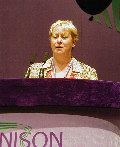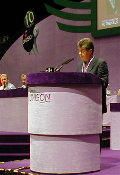Reform - We start from where things are
 UNISON
delegates pledged to step up their campaign against the privatisation
of our public services in the debate on Public Service Reform, on
Tuesday. UNISON
delegates pledged to step up their campaign against the privatisation
of our public services in the debate on Public Service Reform, on
Tuesday.
Poorer services and attacks on workers pay and conditions were
common themes throughout the debate. Government ministers were slammed
for ignoring trade unions and public opinion and rushing 'full tilt'
towards privatisation.
The government seemed happy to subsidise profit hungry privateers
while starving local government services, said one delegate.
"UNISON is the union at the forefront of the fight against PFI.
For 10 years we've built coalitions, lobbied, campaigned both at
local and national level.", said Jane Carolan, Scotland NEC member,
moving Composite C.
"You don't get improvement by handing over public services to private
companies that's not UNISON propaganda, it's established fact!",
said Jane as she listed examples of taxpayers money being wasted
on privatised services.
£65 million to bail out Air Traffic Control and another £2 million
to Harringey schools. Money wasted on PFI hospitals such as Bishop
Auckland where there have been power failures, the Western Eye Infirmary
unit which needs to close because it doesn't meet space standards
and the Wishaw hospital where they are turning away patients.
Jane's PFI failures list continued. "Amey the well known PFI contractor
was now in severe financial difficulties so where would that leave
schools in Glasgow and Edinburgh?" Adding to this evidence was the
Audit Commission who were very critical of the quality of schools.
 Following
on later in the debate, Mike Kirby (Scotland Convenor) told us that
even though the European commission had rated the British economy
as one of the healthiest in Europe, it had slated the poor quality
of public services. Following
on later in the debate, Mike Kirby (Scotland Convenor) told us that
even though the European commission had rated the British economy
as one of the healthiest in Europe, it had slated the poor quality
of public services.
"We believe that public services are essential to secure sustained
economic growth and equality of access to employment and economic
opportunities", said Mike and emphasised that 'UNISON was prepared
to take up the challenge of revitalising our public services.'
"In order to improve our public services we need to recognise that
we start from where things are and not where we'd like them to be",
Mike added, and suggested that this could be done by collaborating
in a changing environment and using public service networks for
a more rapid and effective way of responding to change rather than
constant boundary reviews and reorganisations of services."
top
Agenda For Pensions Change
Scottish young member Graham Carswell (Scottish Electricity) had
the unenviable task of trying to liven up the pensions debate so
that it appealed to delegates both young and old. Graham called
for 'young workers to be educated on the pensions crisis'.
And so that the not so young felt included, he reminded us that
in the past five years three quarters of final salary pension schemes
had been closed.
To applause, Graham called for the restoration of the link between
earnings and the state pension.
Graham was following on from the NEC mover of the composite, Pauline
Thorne, Vice President who described the present situation as 'pensions
in crisis as never before'.
Final salary pension schemes are being closed and replaced with
defined schemes on a regular basis in the private sector. And now
public sector pension schemes were under review, said Pauline.
For the employer the defined scheme has the advantage of transferring
the payment risk to the employee.
Pauline also told us about the Pickering report on pensions, which
the government intends to implement in a modified form.
Amongst among other things, the report recommends that the age
at which a non- reduced pension is available should be raised from
60 to 65 years.
Veteran Scottish delegate Jim McDougal of Doncaster Health later
in the debate also reminded us that the proposals include raising
the pension unit from 1/80 to 1/100.
What this means, said Jim, is that 50 years of work is required
for a full pension and not the present 40.
As if this was not bad enough the pension would be based on the
average wage throughout life as opposed to a pension based on the
best of the last 3 working years.
Although final salary pension schemes were the best available,
Jim conceded that they had a flaw. The flaw being that low pay meant
low pensions even if they were final salary schemes.
The motion was carried.
In the next motion (74) on pensions, Julia McIlhatton Lanarkshire
Primary Care echoed Jim's reference to low pay and low pensions.
Agenda for Change in the NHS would lead to reduced earnings especially
in Scotland, said Julia, and this in turn would lead to reduced
pensions.
The motion was seeking full compensation for part time workers
who had been denied the right to pension schemes for years.
The NEC opposed this idea saying that there was no legal obligation
on employers to compensate individuals and that if the motion was
passed it would tie negotiators to an unachievable deal.
The platform speaker suggested that a solution could be to offer
the individuals interest free loans payable over a period of time.
In his reply, the mover, Glen Kelly, said that without full compensation,
low paid part time workers who had been denied their rights for
years would have to find thousands of pounds in back contributions.
'Members should not be penalised' said Glen, the employers were
guilty and they should pay!' The delegates agreed and the motion
was carried amidst loud applause and cheers.
top
|



